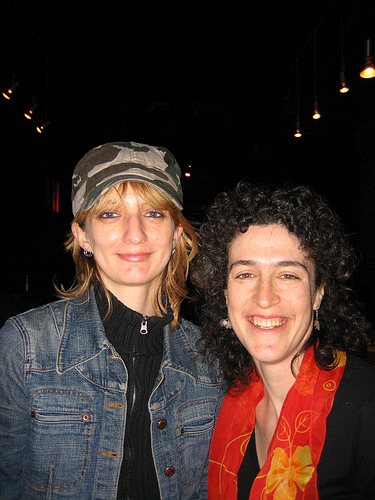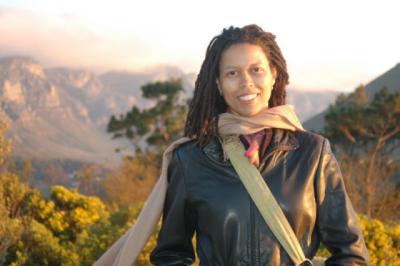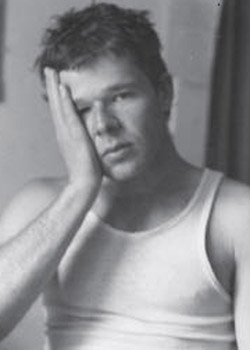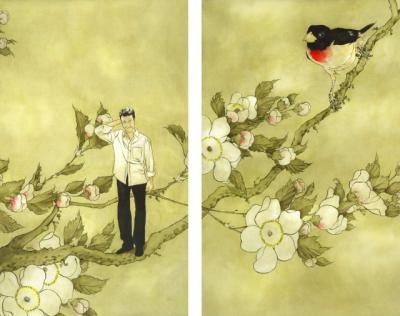PARIS: The esteemed Martinique poet and politician Aimé Césaire, a leading figure in the movement for black consciousness, died Thursday, the French president’s office and a hospital said. He was 94.
Césaire was involved in the fight for French West Indian rights, and he also served as a lawmaker in the lower house of France’s parliament for nearly 50 years. French President Nicolas Sarkozy successfully led a campaign last year to change the name of Martinique’s airport in honor of Césaire.
Sarkozy on Thursday praised Césaire as “a great poet” and a “great humanist.”
“As a free and independent spirit, throughout his whole life he embodied the fight for the recognition of his identity and the richness of his African roots,” Sarkozy said. “Through his universal call for the respect of human dignity, consciousness and responsibility, he will remain a symbol of hope for all oppressed peoples.”
~~~
From The liberating power of words – interview with poet Aime Cesaire – Interview
Aimé Césaire: I’ve always had the feeling that I was on a quest to reconquer something, my name, my country or myself.
That is why my approach has in essence always been poetic.
Because it seems to me that in a way that’s what poetry is.
The reconquest of the self by the self….
I think it was Heidegger who said that words are the abode of being. There are many such quotations. I believe it was Rene Char, in his surrealist days, who said that words know much more about us than we know about them.
I too believe that words have a revealing as well as a creative function…
The Abbe Gregoire(1), Victor Schoelcher(2) and all those who spoke out and still speak out, who campaigned for human rights without distinction of race and against discrimination, these were my guides in life. They stand forever as representatives of the West’s great outpouring of magnanimity and solidarity, an essential contribution to the advancement of the ideas of practical universality and human values, ideas without which the world of today would not be able to see its way forward. I am forever a brother to them, at one with them in their combat and in their hopes…
I really do believe in human beings. I find. something of myself in all cultures, in that extraordinary effort that all people, everywhere, have made – and for what purpose?
Quite simply to make life livable!
It is no easy matter to put up with life and face up to death.
And this is what is so moving.
We are all taking part in the same great adventure.
That is what is meant by cultures, cultures that come together at some meeting-point….
I think it was in a passage in Hegel emphasizing the master-slave dialectic that we found this idea about specificity. He points out that the particular and the universal are not to be seen as opposites, that the universal is not the negation of the particular but is reached by a deeper exploration of the particular.
The West told us that in order to be universal we had to start by denying that we were black. I, on the contrary, said to myself that the more we were black, the more universal we would be.
It was a totally different approach. It was not a choice between alternatives, but an effort at reconciliation.
Not a cold reconciliation, but reconciliation in the heat of the fire, an alchemical reconciliation if you like.
The identity in question was an identity reconciled with the universal. For me there can never be any imprisonment within an identity.
Identity means having roots, but it is also a transition, a transition to the universal….
We are far removed from that romantic idyll beneath the calm sea. These are angry, exasperated lands, lands that spit and spew, that vomit forth life.
That is what we must live up to. We must draw upon the creativity of this plot of land! We must keep it going and not sink into a slumber of acceptance and resignation. It is a kind of summons to us from history and from nature….
And so I have tried to reconcile those two worlds, because that was what had to be done. On the other hand, I feel just as relaxed about claiming kinship with the African griot and the African epic as about claiming kinship with Rimbaud and Lautreamont – and through them with Sophocles and Aeschylus! …
I have never harboured any illusions about the risks of history, be it in Africa, in Martinique, in the Americas or anywhere else. History is always dangerous, the world of history is a risky world; but it is up to us at any given moment to establish and readjust the hierarchy of dangers. …
At any rate, it is for me the fundamental mode of expression, and the world’s salvation depends on its ability to heed that voice. It is obvious that the voice of poetry has been less and less heeded during the century we have lived through, but it will come to be realized more and more that it is the only voice that can still be life-giving and that can provide a basis on which to build and reconstruct….
* And yet this century has not been one where ethics has triumphed, has it?
A.C.: Certainly not, but one must speak out, whether one is heeded or not; we hold certain things to be fundamental, things that we cling to. Even if it means swimming against the tide, they must be upheld.
In other words, poetry is for me a searching after truth and sincerity, sincerity outside of the world, outside of alien times. We seek it deep within ourselves, often despite ourselves, despite what we seem to be, within our innermost selves.
Poetry wells up from the depths, with explosive force.
The volcano again.
No doubt I have reached the moment of crossing the great divide but I face it imperturbably in the knowledge of having put forward what I see as essential, in the knowledge, if you like, of having called out ahead of me and proclaimed the future aloud.
That is what I believe I have done; somewhat disoriented though I am to find the seasons going backwards, as it were, that is how it is and that is what I believe to be my vocation.
No resentments, none at all, no ill feelings but the inescapable solitude of the human condition. That is the most important thing.
~
1. Henri Gregoire (1750-1831), French ecclesiastic and politician, a leader of the movement in the Convention for the abolition of slavery. Ed.
2. French politician (1804-1893), campaigner for the abolition of slavery in the colonies, Deputy for Guadeloupe and Martinique. Ed.
–The liberating power of words – interview with poet Aime Cesaire – Interview
~~~









March 2nd, 2008 at 5:12 pm eEver notice how Evie takes the foreground of
pictures and the sound of readings? There is
a direct presence. No other.
March 2nd, 2008 at 7:43 pm eLooking over wrongs, I’ve noticed
over the years that oafishness and
subconscious deflection are often
the cause than intention and aggression.
Which is to say, maybe things are less
deliberate, more subtle, but paradoxically
harder to dig up. Just a thought from mulling
the comments I’ve seen by editors of both
genders for years. True Anthropology might
find more natural things than the old wounding
paradigms presupposed. If it could ever escape
the hothouse of likely well over 100,000 trawlers
trapped in an inland sea, and all the political
3rd rails, that is.
March 2nd, 2008 at 10:05 pm eOops…I am out of sync with the
aggressiveness thing that happened..
sorry bout the babbling.